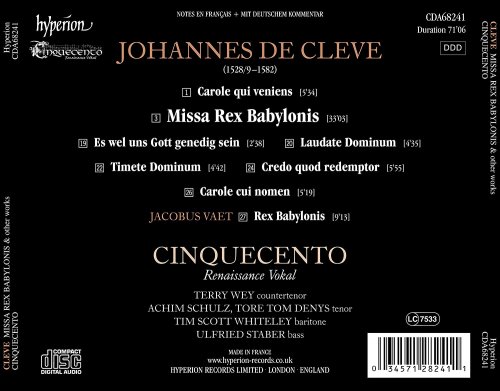Terry Wey, Cinquecento - Cleve: Missa Rex Babylonis (2020)

Artist: Terry Wey, Cinquecento
Title: Cleve: Missa Rex Babylonis
Year Of Release: 2020
Label: Hyperion
Genre: Classical sacred
Quality: FLAC (image+.cue,log,scans)
Total Time: 01:10:51
Total Size: 330 MB
WebSite: Album Preview
Tracklist:Title: Cleve: Missa Rex Babylonis
Year Of Release: 2020
Label: Hyperion
Genre: Classical sacred
Quality: FLAC (image+.cue,log,scans)
Total Time: 01:10:51
Total Size: 330 MB
WebSite: Album Preview
Johannes de Cleve (1528/9-1582)
Carole qui veniens
01. Carole qui veniens a Caesare
02. En tibi gratantes
Missa Rex Babylonis
03. Kyrie I
04. Christe
05. Kyrie II
06. Gloria in excelsis Deo
07. Qui tollis peccata mundi, miserere
08. Credo in unum Deum
09. Et incarnatus est
10. Crucifixus
11. Et resurrexit tertia die
12. Et iterum venturus est
13. Sanctus
14. Osanna I
15. Benedictus
16. Osanna II
17. Agnus Dei I
18. Agnus Dei II
19. Es wel uns Gott genedig sein
Laudate Dominum
20. Laudate Dominum omnes gentes
21. Gloria Patri, et Filio
Timete Dominum
22. Timete Dominum omnes sancti eius
23. Divites eguerunt et esurierunt
Credo quod redemptor
24. Credo quod redemptor meus vivit
25. Reposita est haec spes mea
26. Carole cui nomen
Jacobus Vaet (c1529-1567)
Rex Babylonis
27. Rex Babylonis venit ad lacum
28. Tunc rex ait
When it comes to the third quarter of the 16th century, it was the radicals (Luca Marenzio and his still wilder followers) and the conservatives (Palestrina and the Spanish school) who have received most of the ink, grooves, and bytes. However, there were also composers who followed in the mainstream of Franco-Flemish music flowing from Josquin and, after him, Nicolas Gombert and Giaches de Wert (once dubbed the Ert Brothers). Unlike those composers, Johannes de Cleve worked in Vienna, as evidenced by a German-language motet heard here. He was preceded by the similarly unknown Jacobus Vaet, whose motet Rex Babylonis he subjected to parody mass treatment: elaboration of the full sonorities of a model composition, not just a single cantus firmus line. Vaet's motet is included here, which is desirable, but it is placed at the end (less desirably). It's a dense piece in the Gombert mold, consisting of points of imitation with few holes, and when de Cleve elaborates it, the result is a very complex texture indeed, which makes it all the more affecting when de Cleve drops in a sparse and absolutely lovely Incarnatus and Crucifixus. The mass is the highlight here, but the motets, big two-section works, are all interesting polyphonic essays in which one can hear the influence of the Italian progressives in some pungent dissonances. The small vocal group Cinquecento specializes in this repertory; the one-voice-per-part performance is not ideal, but the individual singers are beautiful, and the group deserves credit for pulling this fine work off the scrap heap of history.









